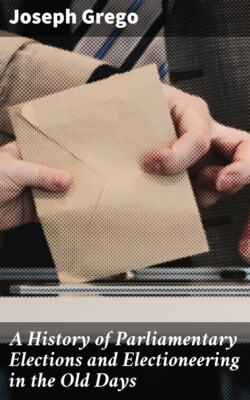Читать книгу A History of Parliamentary Elections and Electioneering in the Old Days - Joseph Grego - Страница 19
На сайте Литреса книга снята с продажи.
“1678.
Оглавление“Here’s a House to be let,
For Charles Stuart swore
By Portsmouth’s honour
He would shut up the door.
“Enquire at the Lodgings
Next door to the pope,
At Duke Lauderdale’s head
With a cravat of Rope,
“And there you will hear
How next he will let it,
If you pay the old price
You may certainly get it.
“He holds it in-tail
From his Father, who fast
Did keep it long shut,
But paid for’t at last.”
Charles II.’s third, or Habeas Corpus Parliament, showed a determination to exceed its predecessor in opposing the Court, and seemed ambitious of imitating that of 1640, the reminiscences of which were still of a portentous character, and filled with dread as regarded the survivors of those uncompromising times:—
“The Habeas Corpus act is past, And so far we are safe; He can’t imprison us so fast, But straight we have relief; He can’t deny us aught we ask, In so much need he stands; And before that we do money give, We’ll tie up both his hands.”
Charles very naturally found this parliament beyond his control, so it was prorogued May 27, 1679, to the 14th of August, but dissolved on the 10th of July. The whole country was in commotion during August and September in electioneering contests, preparing for the fourth parliament. It is to be regretted that electioneering broadsides have, as a rule, been allowed to perish; they would prove a mine of curious information.
The following is a pertinent allusion to the eventualities of the “poll:”—
“But most men did think
He had not so much chink,
Nor could pay for the poll of the County,
And therefore did fear
It would cost them too dear
Should they accept of his Bounty.”
(The Worcestershire Ballad.)
The opprobrious terms of Whigs and Tories were freely exchanged. Here is a Whig’s view of the “king’s men:”—
“As Rascals changing rags for scarlet coats,
Cudgell’d before, set up to cut Whig throats.”
The wit lay rather with the Cavaliers, though it must be confessed their opponents had the best of the argument when reasoning on facts.
The definition of the nickname Tory, as it originally arose, is given in “A New Ballad” (Narcissus Luttrell’s Collection):—
“The word Tory’s of Irish Extraction, ’Tis a Legacy that they have left here, They came here in their brogues, And have acted like Rogues, In endeavouring to learn us to Swear.”
By way of answer, the Tories exulted in their loyalty:—
“Let Tories guard the King,
Let Whigs on halters swing.”
The Court party denounced—
“Visions, Seditions,
And railing Petitions.”
The designs of the various factions were thus summed up:—
“Sir Tom would hang the Tory, And let the Whig go free: Sir Bob would have a Commonwealth And cry down Monarchy.”
The Tories retaliated upon their antagonists with interest, though they feared the zealots not a little, as the following ballad illustrates:—
“What! Still ye Whigs uneasie! Will nothing cool your brain, Unless Great Charles, to please ye, Will let ye drive his Wain? That Peer-less House of Commons, So zealous for the Lord, Meant (piously) with some on’s To flesh the Godly sword.”
(A Tory in a Whig’s Coat.)
One of the most popular “counter-blasts” to the Whig pretensions is embodied in the following parody, which enjoyed considerable favour, though not equal to Andrew Marvell’s diatribes “on the other side:”—
